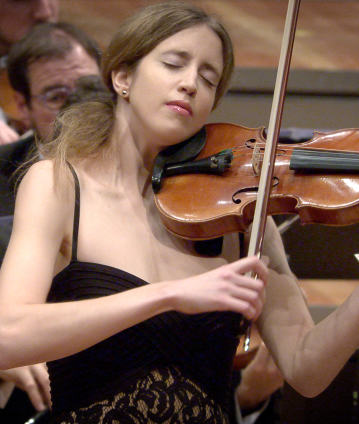Iván Fischer and Vilde Frang present Bartók’s Violin Concerto No. 1

An unhappy love affair inspired Béla Bartók’s Violin Concerto No. 1, which is characterised by extraordinary tenderness and emotional depth. The soloist is Vilde Frang, who made her debut with the Philharmoniker at the 2016 European Concert and impressed the audience with her passionate, singing tone. Conductor Iván Fischer also presents excerpts from Mendelssohn’s magical, gossamer-light music for A Midsummer Night’s Dream.
Béla Bartók wrote his First Violin Concerto for his early love, the young violinist Stefi Geyer “as if in a narcotic dream”: he inscribed the words “My Confession” on the front page of the manuscript. The first four notes from the solo violin (a real ʻearwormʼ) was described by the composer himself as the “Stefi motif”. However, with late-Romantic expression, the eager and yearning melody, full of Tristan-like passion, is followed by a free fugato – his love was not returned. The work was written, according to the composer, in “still happy times. Although it was only half happiness”. But Bartók was capable of self-irony: at the beginning of the second movement, which continues on from the first without interruption, the highest note of a cadential upward run in the solo violin is counteracted by a hint of Wagner’s “Tristan chord” in the orchestra. The Norwegian virtuoso violinist Vilde Frang, formerly a beneficiary of Anne-Sophie Mutter’s support for highly talented musicians, and now acclaimed worldwide for her virtuosity, musicality and expressiveness, is the soloist in Bartók’s First Violin Concerto in these concerts conducted by Iván Fischer: “I like Bartók, the sincerity and logic of his musical language which, for me, is closely related to Bach.”
Before Bartók’s declaration of love, the long-time chief conductor of the Konzerthausorchester Berlin has programmed the composer’s Hungarian Peasant Songs: catchy melodies, all based on folk songs. But Bartók’s variations, harmonies and structural additions go far beyond mere arrangements. The final item of the evening is excerpts from Felix Mendelssohn’s music for Shakespeare’s A Midsummer Night’s Dream, selected by Iván Fischer himself. This Mendelssohnian pièce de résistance begins of course with the “concert overture” (op. 21), written as early as the summer of 1826 about which even Robert Schumann enthusiastically said: “The bloom of youth lies suffused over it as over scarcely any other of the composer’s works.” When Mendelssohn composed the incidental music (op. 61), commissioned by the Prussian king Friedrich Wilhelm IV in 1843, he used his youthful composition written approximately 17 years earlier unaltered as an introduction. However, there is no break in style: the abundance of melodic ideas, the colourful intensity of the harmonies and the ever changing swirling rhythms were transferred with great artistry from the overture to the newly composed parts of the incidental music.
© 2017 Berlin Phil Media GmbH
Related interviews